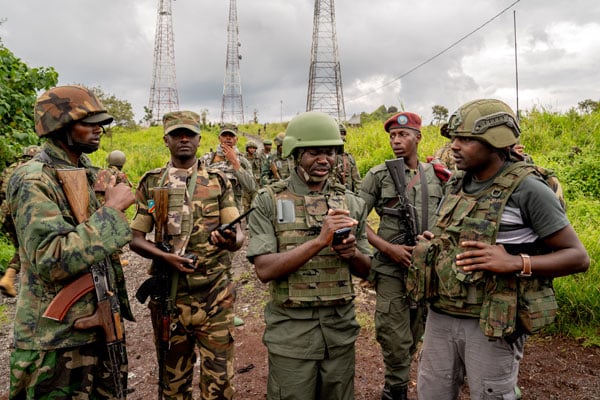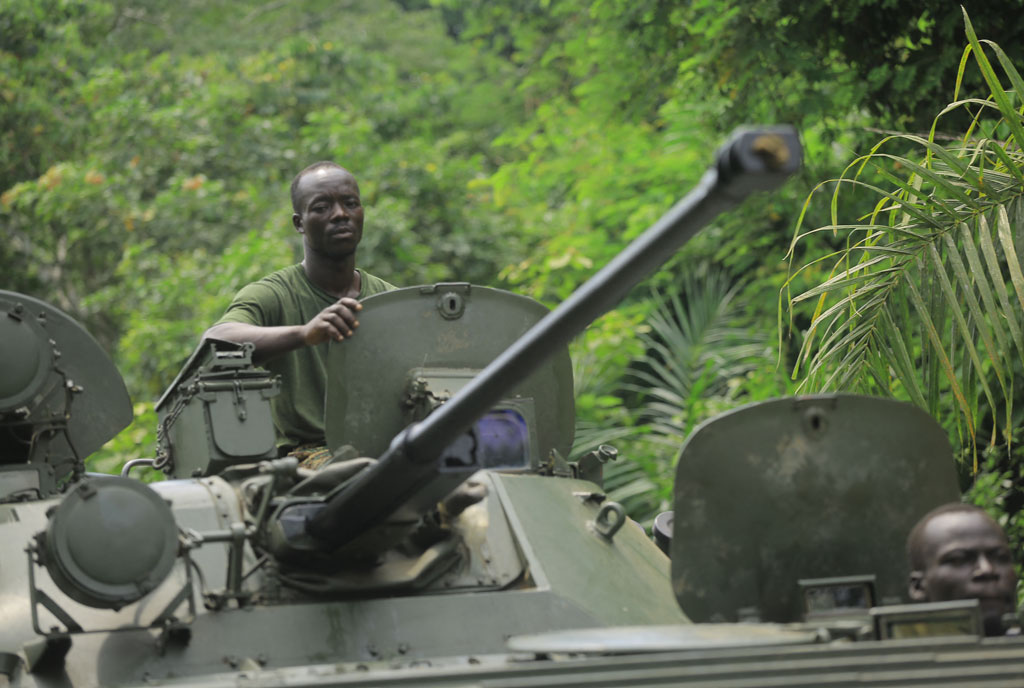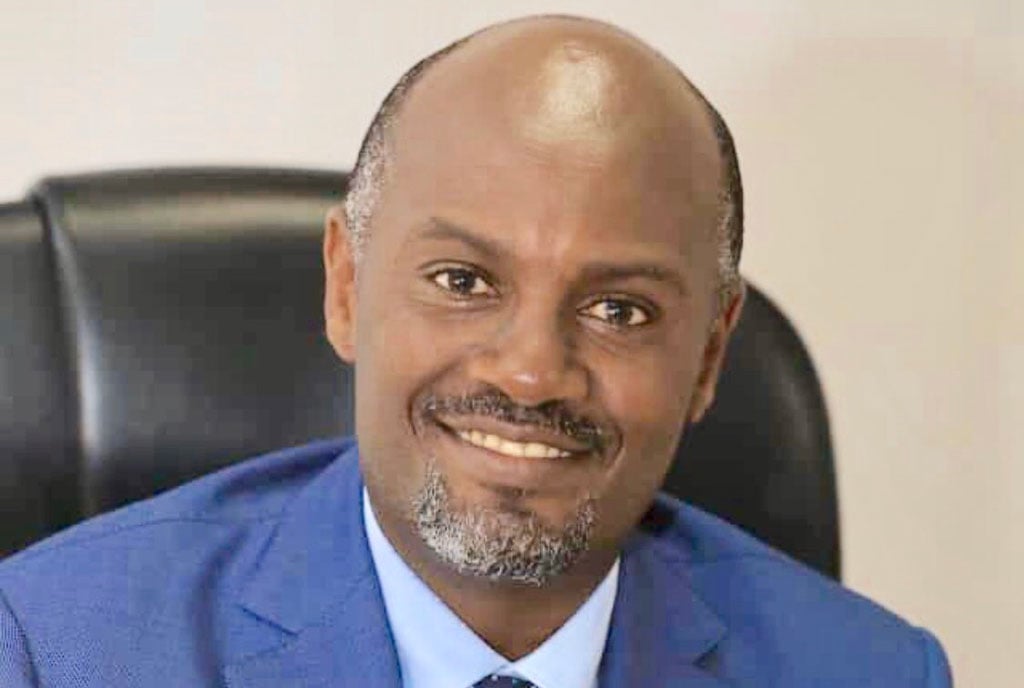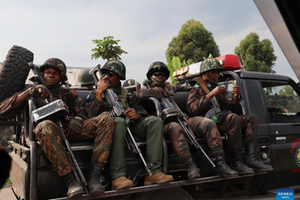
UPDF’s Defence Intelligence and Security head, Maj Gen James Birungi and his Rwandan Defence Intelligence counterpart, Brig Vincent Nyakarundi, after signing a memorandum of understanding between the two armies in May 2022. Inset is Ugandan journalist Andrew Mwenda. PHOTO/COMBO/COURTESY
Uganda is clandestinely offering support to March 23 Movement (M23), a sanctioned Congolese rebel group, according to a United Nations Panel of Experts.
A leaked report of the panel seen by Monitor also names veteran Ugandan journalist Andrew Mwenda as an interlocutor in Kampala, the country’s capital, scouting diplomatic cover for the insurgents.
Uganda denies rendering support to M23 as does Mr Mwenda, with each separately saying their involvement in broaching a diplomatic end to the conflict was known to Kinshasa and other stakeholders.
The UN-authorised investigators report that Uganda’s military, the Uganda People’s Defence Forces (UPDF), directly and through its intelligence arm, the Defence Intelligence and Security (DIS), actively supports M23 and Alliance Fleuve Congo (AFC) rebel bands in eastern Democratic Republic of Congo (DRC).

M23 rebels talk before leaving their position in Kibumba in eastern Democratic Republic of Congo on December 23, 2022. PHOTO / AFP
Uganda’s Chieftaincy of Military Intelligence (CMI), was renamed DIS in the Uganda People’s Defence Forces Establishment 2021 unveiled in February.
Its head, Maj Gen James Birungi and his Rwandan Defence Intelligence counterpart, Brig Vincent Nyakarundi, in May 2022, signed a memorandum of understanding, signaling the thawing of then icy Uganda-Rwanda relations brokered by First Son Muhoozi Kainerugaba.
Insiders familiar with the arrangement said Uganda’s Foreign Affairs ministry, the clearing house for the country’s engagement with other states, was not directly involved although the spy agency-to-spy agency deal aided, among others, intelligence sharing.
Muhoozi was a lieutenant general and chief of UPDF Land Forces at the time and optimistic that the deal negotiated under his purview during a four-day engagement in Entebbe, a peninsula town south of Kampala, undergirded a reset of relations between Rwanda and Uganda after years of each giving the other a cold treat.
“…we have reached good resolutions on how to work together … I thank our two great presidents @kagutamuseveni and @paulkagame on revitalising our strong alliance. Viva UPDF! Viva RDF,” he noted in a May 16, 2022 post on X, formerly Twitter, referring to the Ugandan and Rwandan militaries.

Uganda People's Defence Forces (UPDF) troops are seen on the Mbau-Kamango road in the Beni district on December 8, 2021. PHOTO/AFP
Uganda had since November 2021 been conducting a joint military offensive dubbed Operation Shujaa with the Congolese army, FARDC, against the Allied Democratic Forces (ADF) rebels sequestered in the jungles of eastern DRC.
The Entebbe deal came three months after M23 captured the significant Bunagana border town (they occupy to-date), and in the wake of Muhoozi fondly calling the rebels in his tweets as “our brothers”, which galvanised Congolese leaders to accuse Uganda of aiding the rebels and pressuring President Tshisekedi to order UPDF out.
Muhoozi was in October 2022 promoted to a four-star general and temporarily shipped out of the military to a senior advisor to the President, the commander-in-chief of UPDF, who returned him as Chief of Defence Forces in March this year.
Uganda has over the years denied claims it supports M23, but a Panel of Experts appointed under the aegis of the UN Security Council to scrutinise compliance with its sanctions regime on M23, says the allegations are true.
“The [UN Experts] Group … obtained evidence confirming active support to M23 by certain UPDF and Chieftaincy of Military Intelligence (CMI) officials,” the leaked report reads in part.
“Intelligence sources and individuals close to M23 also confirmed the presence of Ugandan military intelligence officers in Bunagana since at least late 2023, to coordinate with M23 leaders, provide logistics, and transport M23 leaders to M23-controlled areas.”
We were unable to speak to Brig Felix Kulayigye, the defence public information officer, for this article.
The Ministry of Foreign Affairs, however, said the renewed accusations, like the past ones, are unfounded because Uganda is a peace builder, not a war monger in the region.
“The engagement we had with M23 was aimed at ending the conflict. We wanted them to have direct engagement and give their demands to the Democratic Republic of Congo.
It was very simple,” said Mr Henry Oryem Okello, the State minister for International Affairs.

State Minister for Foreign Affairs Henry Okello Oryem. PHOTO | FILE
According to the minister, the government of re-elected Congolese President Felix Tshisekedi was in the know about Uganda’s contact with M23 to “share their demands so that Uganda would pass them to Kinshasa”.
We were unable to independently corroborate this account with the DRC government.
“We didn’t bring them (M23 rebels) to Uganda,” said Mr Oryem by telephone, “We didn’t give them arms.”
This rejoinder flies in the face of what the Panel of Experts said they found: Evidence of frequent M23 and AFC (rebel groups’) activities on Ugandan territory.
“Despite evidence documenting the regular transit of M23 and RDF troops, vehicles, and military supplies through Ugandan territory, the Ugandan government, including its military intelligence service, claimed not to have recorded the presence of any foreign troops or material on its territory since the beginning of the M23 crisis. However, the extent and frequency of the movements render such a presence highly unlikely to go undetected,” the report reads in part.
The United Nations Security Council sanctioned six rebel leaders in eastern DR Congo in February, among them, the M23 spokesman.
The world body said M23 is supported by Rwanda and the rebel group has committed serious violation of international law, including mass rape and killings, abductions and forced displacement.

This photo combo shows Rwandan President Paul Kagame and his DR Congo counterpart Felix Tshisekedi.
Kigali has repeatedly denied claims of its involvement on the enemy side inside Congo, but retained its right to deploy capabilities for self-defence against remnants of the Interahamwe genocidaires holed up in North and South Kivu provinces.
Allegations that Uganda is complicit resurrect memories of the 1996-2003 invasion of then Zaire (now DRC) by Uganda and Rwanda, which ended in the former being fined $10b by the International Court of Justice for plunder of Congo resources.
The UN court found that the pillaging was by individuals, rather than institutions, but still fined the state of Uganda, leaving open the future consequences of the new findings of alleged Uganda support for M23 --- even if tied to tacit endorsement by powerful military figures rather than UPDF as an institution.
The Panel of Experts reported that Uganda has allowed sanctioned M23 and other rebel leaders to evade travel bans under the sanctions, including hosting them.
“It is noteworthy that M23 leaders, including sanctioned individual Sultani Makenga, travelled to Entebbe and Kampala in violation of the travel ban,” the report indicated, adding, “AFC’s leadership, including Corneille Nangaa, who recently resided in Kampala, held meetings with representatives of Congolese armed groups and individuals closely linked with M23.”

M23 commander Col Sultani Makenga (right) and his bodyguards tour Bunagana, a town near the Ugandan border, on July 8, 2012. PHOTO/FILE/|AFP
The experts said multiple sources “witnessed Ugandan soldiers crossing into the DRC through Kitagoma on January 27, 2024 and operating in M23-controlled areas, in particular Busanza groupement and Rutshuru town, from where one group moved towards Tongo, and the other towards Mabenga”.
The group said veteran journalist-cum-lobbyist Andrew Mwenda moonlighted as a liaison officer and in that capacity contacted western embassies in Kampala to talk them into lifting the group off the sanctions list.
“Nangaa and Lawrence Kanyuka benefited from the support of Ugandan public figure Andrew Mwenda in approaching several embassies in Kampala in March 2024 to contest sanctions imposed on M23 leaders and to elicit sympathy for the cause of AFC/M23,” they wrote.

Veteran Ugandan journalist Andrew Mwenda. PHOTO/FILE/COURTESY
Mr Mwenda confirmed meeting Kanyuka, one Desire Rwigyema and a third M23 leader at his office in Kampala but said he did so as a journalist and afterwards reached out to foreign missions that could leverage on Kinshasa to accept talks with the rebels.
“I was shocked, though not surprised, that the same ‘panel of experts’ produced a report repeating their original allegations without any reference to my explanation. They deliberately refer to me as ‘a public figure’, ignoring the fact that I am a journalist … Instead, they said I work as a liaison person between Kigali and Kampala, something I last did in 2018,” he said in an extract he shared with this newspaper from his original column in The Independent magazine edition on the stands.
The UN Panel of Experts in the report said M23 was drafting recruits from refugee settlements in Uganda, notably in Kyaka II in western Uganda and in Nakivale, near the southern Rwandan border.

About 13,000 Congolese nationals fled into Uganda through Bunagana Border Post in Kisoro District following heavy fighting between government forces and suspected M23 rebels in the eastern DR Congo on March 28, 2022. PHOTO/ROBERT MuHEREZA
Enlisted refugees are lured by false financial incentives, including children, and have been trafficked to DRC since 2022, mainly through Bunagana.
“These recruitment circuits were also utilised for the recruitment of Banyamulenge youth, including minors,” the report reads in part.
Mwenda defends meeting with Congo rebel leaders
“As a journalist, newspaper columnist, radio talk show host, television show panelist, social media personality and owner of a media company, I was interested. My work and opinions require collection of information from primary sources. I talk to people of all backgrounds to inform myself. I was, therefore, most keen to talk to M23 leaders to hear their stories.
I met them around March 11 at my office. They included Lawrence Kanyuka, Desire Rwigyema and a third person whose name I cannot remember. I had always thought M23 was an ethnic militia of the Tutsi of eastern DRC. To my surprise, Kanyuka told me he is from the Luba ethnic group, just like President Felix Tshisekedi. They gave me the list of their leaders, political and military, most of whom were not Tutsi. In fact one of them is a Hutu Congolese. I was intrigued and we sat down for a long conversation.
They told me in October 2020, Kanyuka had led an M23 delegation to Kinshasa. They spent there 14 months negotiating a peace settlement with the government. The peace discussions agreed that M23 should demobilise and have their fighters integrated into the Congolese army. But just when the M23 were grouping to surrender in November 2022, they were attacked by Congolese forces. Many of their soldiers were killed. M23 protested to Kinshasa and got no response. However, they told me they did not want to continue fighting. They want the peace process back on track.
They said they want me to help them contact the embassies of the US, France, Belgium and the European Union. These four, they said, have influence in Kinshasa and can help establish a communication channel with the government. Immediately, I saw a chance to bring the two sides to talk, end the fighting in Congo and bring about peace. I have read about such intractable civil conflicts in many nations ... The lesson from my wide reading is that only when governments seek political accommodation with rebels does military victory on the battlefield translate into permanent peace at the political level.
Thus, I felt that such an opportunity should not be missed. [The] Democratic Republic of Congo has been mired in this intractable conflict for decades. I, therefore, called the US, French and EU missions in Kampala and briefed them on my meeting with M23. I told them these rebels are looking for someone with influence to help establish a channel of communication with Kinshasa. The aim is to inform the government of DRC that M23 is willing to surrender.
The officer at the French embassy told me outright that they are not allowed to meet M23. The officer at the US embassy told me their political secretary was interested, but needed to consult Washington [DC] first. Two days later, he told me Washington had declined. However, the US embassy official asked me if M23 leaders had met anyone from the Uganda government to which I said I do not know. If they did, it would be a low-ranking person because I know Uganda is managing a very delicate relationship with DRC and would be afraid to antagonise Kinshasa. However, I got the impression that the Americans were on an intelligence-gathering mission.
… The officer at the EU agreed to meet M23 leaders and said this was purely informal. We met and had a discussion that lasted four hours. He asked many questions and took voluminous notes. I did not hear from any side after that. In early May, I got a call from the Uganda Ministry of Foreign Affairs. They said they had been contacted by the UN Security Council on behalf of a “Panel of Experts” on the DRC. The Panel claimed [that] I was involved with M23 [rebels], trying to help them talk to “several Western embassies” to remove sanctions against the rebel group. The officials at Foreign Affairs gave me the dossier of what the “Panel of Experts” was claiming. It even claimed Uganda trains M23. It was clear the Americans are the ones who reported this to the UN based on the conversations I had with their staff.”
Who is Andrew Mwenda
Andrew Mwenda, 52, is a journalist-cum-lobbyist whose professional life spans decades of reporting and editing at Monitor Publications Ltd, publisher of Daily Monitor newspaper and owner of KFM where he ran the popular Andrew Mwenda Live talk show.
After a year-long stint at Stanford University in the United States where he was a John Knight fellow, Mr Mwenda resigned from the newspaper to co-found The Independent magazine where to-date he remains the managing director.
His incisive reportage and exposés, including on corruption, while at Monitor earned him a reputation of an independent journalist critical of President Museveni’s government he often derided as incompetent.
Police regularly arrested and detained Mr Mwenda for these ‘sins’, but his closeness with First Son Muhoozi Kainerugaba remain a subject of disquiet among those knowledgeable of the friendship.
In subsequent years, Mr Mwenda gravitated towards power and its trappings and turned a confidant and public defender of President Museveni and his government.
He moonlighted as a political fixer, including for Rwandan President Paul Kagame, who in 2011 named him on a 23-member Presidential Advisory Council for seven years.

Rwandan President Paul Kagame (2nd right) and First Lady Jeannette Kagame host Uganda’s first son General Muhoozi Kainerugaba (3rd right) as he celebrated his 49th birthday on April 24, 2023. PHOTO | COURTESY | PRESIDENCY | RWANDA
Mwenda's bonds with the First Son Kainerugaba, now a general and Chief of Defence Forces, meant both over the past couple of years publicly took joint trips to Kigali and spoke similar language: in support of M23 rebel group and Rwanda accused by Kinshasa of supporting it.
A bombshell for him has come this month from indictments by a United Nations Panel of Experts that in a leaked report named him as an interlocutor lobbying for removal of the Congolese rebel group off UN sanctions list.
A holder of a degree in Journalism and Mass Communications from Makerere University, Mr Mwenda pursued graduate studies at the School of Oriental and African Studies (SOAS) in London on the British Government’s Chevening scholarship.
His notable feats in the fight for freedom of expression and of the media in Uganda were stamped when courts scrapped sedition and publication of false news offences from the law books in petitions he and others filed.



